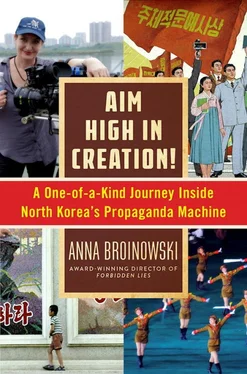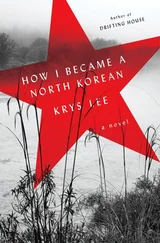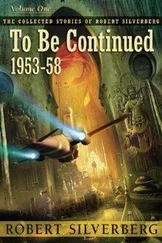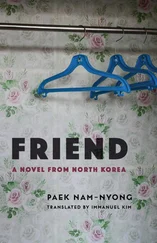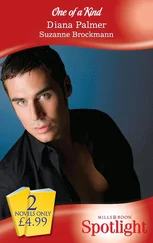Choi’s office is a comfortable cave—soft brown couches, low ceilings, and wood-panelled walls. Hanging above the gently steaming kettle are two North Korean soldiers’ jackets with red stars and gold epaulettes. They look like something out of a James Bond film, but they’re real. Choi shows me a trailer for his last film. Two men in the soldiers’ jackets beat up a girl in a cell. The scene is stiffly acted and badly mixed—but the violence is horrific. It pulls out of focus and dissolves to the same girl, in a sundress, skipping in slow motion through a fairground. The kitsch sentimentality reminds me of Sea of Blood . Choi’s movie is about North Korean refugees in China. If they are lucky, they survive as sex workers and labourers until they can get to South Korea. But if the Chinese authorities catch them, they are handed back to the North Koreans—who torture and, sometimes, execute them. Choi made his film with unpaid defectors in Seoul. It’s low budget, raw, and full of anger.
As a fellow director, Choi is courteous enough to treat my interest in Kim Jong Il seriously, despite loathing the man: “Of course he may possess a flair for art, but it’s too much to say he is gifted. If you show his book to South Koreans, they won’t be impressed, as his rules are not new. What’s interesting is why he wrote them. The Director is the Commander comes from the fact that Party officials used to control filmmaking. But Kim Jong Il said: “The director should not be touched.” The Assistant Director is a Creative Worker was written because when Kim Jong Il took over the industry, the AD was a lazy guy who sat in the corner taking notes. This pissed Kim Jong Il off. He thought it was slothful. He ordered ADs to set up scenes, get them shot on time, and keep the director happy. Now, being an AD in North Korea is how you become a director.”
Choi moves on to Kim’s micromanaging style as the nation’s only film producer: “His word is everywhere: actors should be good-looking, costumes should be modern, acting should be natural, hooligans should look like real hooligans… he controls the whole thing. In The Nation and Destiny , the exiled hero returns home to seek his mother’s forgiveness. She is drinking. Kim Jong Il cut the scene, because ‘North Korean mothers do not drink.’ In Till the End of the World , the filmmakers challenged the idea of traditional love by showing an affair between a man and two women. The writer was expelled, even though Kim Jong Il, who had many mistresses, liked the film. It’s a double standard: ‘It’s a romance if I do it, but a criminal act if you do it.’ He rejected hundreds of high-quality scenarios. The hand-held camera of Western movies is prohibited, because Kim Jong Il felt dizzy watching it. And no matter how excellent the director is, there’s always the danger of being sent to the camps.”
Kim also controlled film classification through the Song Mu Bureau, which translates all imported films, including porn. Instead of using the West’s G, PG, and R ratings, Kim Jong Il rated films as “Suitable for the People” (mostly Chinese and Russian movies), “Suitable for Officials” (mostly James Bond, James Cameron, and Jackie Chan), and “Suitable only for himself” (everything else). Choi sips his tea, full of disgust for the country he’s left behind.
I wonder if he finds North Korean propaganda movies as awful as the regime they promote, but he quickly defends his colleagues: “The standard of North Korean filmmakers is not low at all. They are well qualified. They have simply been cut off from the outside world.” So does Choi think a film made using Kim’s rules will fail? “Not at all. The key point is how you touch people’s emotion. If you just mimic the North Korean style, you will make a parody, and it won’t move people. But if you can make a film in Australia that shows North Koreans’ daily lives… a North Korean–style Australian movie, if you like, that would be good.”
I smile. I have no idea what Choi means. He smiles too. We just sit there, smiling, overwhelmed by the strangeness of my idea. Then I ask Choi if he’d mind singing, and he sighs: “Most North Korean songs are propaganda songs, so we don’t sing them. There is one popular one, from Lim Guk Jung . It’s about fighting the ancient Korean lords.” He starts to sing in a whispery monotone: “The noise of people’s resentment and deplorability, echoing in the air… ” He stops, amused by the irony: “This song implies that high-ranking officials are exploiting ordinary North Koreans. So it was banned.”
Choi beckons over a lean man in a leather jacket who has been listening from the doorway: “Look, you want a real expert on Kim Jong Il, talk to this guy.” Jimmi has the sharp cheekbones, sinewy grace, and rough skin of a Hong Kong action star. He slides into Choi’s seat, locking eyes with my lens: “Please take a good shot—I might have a fan club in America one day.” He is magnetic, an edge of danger behind the charm. Jimmi’s a black belt in tae kwon do. Before he fled North Korea in 2003, he was going to be a movie star. Now he works on Choi’s films for nothing, cleaning hospitals to pay the bills: “I graduated from the Pyongyang University of Film and Theatre. But I was implicated in a serious incident so I had to leave. I don’t want to talk about it.”
Jimmi’s the first defector I’ve met who knows Kim Jong Il’s manifesto better than I do. He studied it for four years. North Korean drama school sounds more like a military boot camp: as a student in the action-movie stream, Jimmi had to do hand-to-hand combat, wrestling, shooting, judo, jeep driving, and marathon running, and train with the North Korean Special Forces. He also had to learn Kim’s teachings by heart.
Jimmi is offended when I confess that North Korean acting seems pretty hammy, from what I’ve seen in Pulgasari and Sea of Blood . He politely points out that a Godzilla rip-off and a sixties melodrama are hardly an accurate indicator of contemporary North Korean drama practice. Overacting is definitely frowned upon.
To explain, Jimmi describes a scene in a naturalistic drama, Star of Chosun , in which a dying soldier speaks his last words to the men who have shot him. “The scene is the climax of the movie. They filmed it for three days in the woods, in minus forty degrees. The actor had to say: ‘Comrades, please choose the right path,’ with a warm-hearted face. This was acting of maximum difficulty. He had to do two things simultaneously—suppress physical pain, and through his bloody, disfigured face, inspire audiences with passionate loyalty to Kim Il Sung.”
Jimmi acts out the death speech on the couch, and Monica and I are transported to the freezing North Korean woods. He’s extraordinary.
Jimmi knew he wanted to perform from age eight, when his mother took him to the Big Top in Pyongyang. He found the clowns and trapeze artists dazzling. At nine, he saw the people of his village mobbing a group of travelling film stars and was struck by the happiness they inspired. He became a performer while in the army, which sounds odd—until you realise that many North Koreans spend their first adult decade in military service before moving onto civilian careers. Jimmi’s beautiful voice gave him his break. As a young cadet, he did daily broadcasts in the barracks: “Dear Party members and labourers. The Great Leader Kim Jong Il has pointed out the following…”
Later, he was put on loudspeakers in factories, theatres, and farms, wherever his unit was stationed. He eventually became a state radio announcer, broadcasting North Korean propaganda to China and Japan. He spoke in heavily accented English about the “imperialist US warmongers” and used a friendlier voice for the Chinese, as North Korea’s brotherly comrades. Kim Jong Il allowed theatre and film students to watch foreign films at the university, which Jimmi entered after eleven years in the army. He saw movies from America, England, Russia, France, Italy, Japan, Romania, and Hong Kong. He liked Hong Kong movies best, followed by the Japanese ones, because they had sex scenes. The American films were mostly war movies, and usually old. They were not properly subtitled and were often truncated.
Читать дальше
